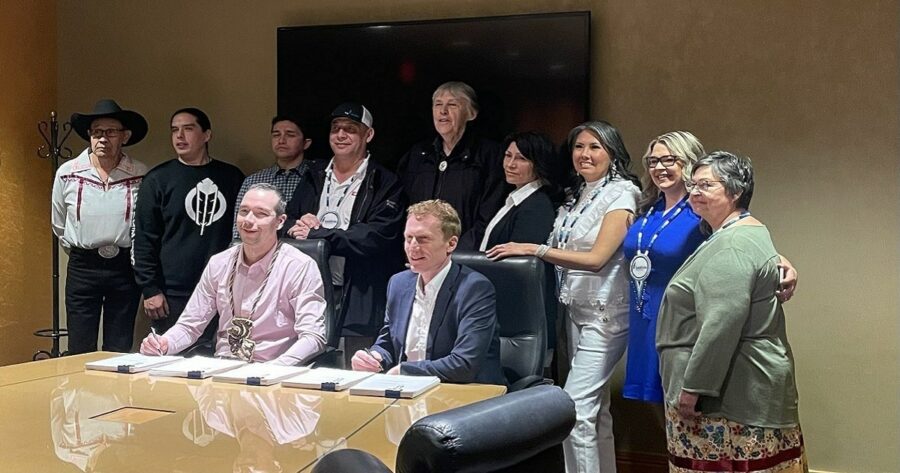5 B.C First Nations Settle 44,266 Acres Treaty Land Entitlement Claims
- TDS News
- Indigenous
- Trending
- April 16, 2023

In a significant development for Indigenous Peoples in Canada, five British Columbia First Nations have reached a settlement with the provincial and federal governments on Treaty Land Entitlement claims. The settlements resolve long-outstanding claims that these First Nations did not receive all of the lands owed to them under Treaty 8, which they signed in 1899.
The First Nations were deprived of the use and benefit of thousands of acres of land owed to them for over a century while the resources on and under those lands were taken and developed by others. Under the settlement agreements, Canada will compensate the First Nations for these losses and costs relating to the claims. The Province of British Columbia will also provide 44,266 acres of Crown land to the First Nations and a financial settlement of $800 million.
The announcement of the settlement agreements was made by Judy Desjarlais, Chief of Blueberry River First Nations; Trevor Makadahay, Chief of Doig River First Nation; Darlene Hunter, Chief of Halfway River First Nation; Justin Napoleon, Chief of Saulteau First Nations; and Roland Willson, Chief of West Moberly First Nations; along with Marc Miller, Canada’s Minister of Crown-Indigenous Relations; Premier David Eby; and Murray Rankin, Minister of Indigenous Relations and Reconciliation in British Columbia.
This settlement marks a significant milestone in addressing historical wrongs and advancing reconciliation with Indigenous Peoples in Canada. Honouring Treaties and legal obligations to First Nations and working collaboratively to renew relationships are fundamental to this process. These settlements will create economic and business opportunities for the entire Northeast region of British Columbia.
The resolution of these Treaty Land Entitlement claims is the result of dedicated efforts by the chiefs, councils, communities, and negotiators since 2004. These Treaty Land Entitlement settlement agreements demonstrate the federal and provincial governments’ commitment to advancing reconciliation, one that shows a commitment to build trust, acknowledges and respects the Treaty relationship, and helps build a better future for all Canadians.
“This is a monumental day for the Blueberry River First Nations community, our elders and the ancestors who came before us,” said Judy Desjarlais, Chief of Blueberry River First Nations.
“This settlement is part of an ongoing process of recognition and healing from Blueberry’s long and difficult history of displacement and marginalization within our traditional territory. We have overcome many significant challenges and obstacles through almost two decades of negotiations to achieve fair compensation from the Crown for our Treaty Land Entitlement claim. We still have a long way to go; but, in the spirit of truth, transparency and reconciliation, we are setting a path for the next seven generations to be able to continue our traditional and cultural way of life on the land our ancestors were from, which they called: ‘Su Nachii K’chige’ – the place where happiness dwells.”
Trevor Makadahay, Chief of Doig River First Nation, added, “Council is very committed to meeting with you all in the future, and the membership are very happy to have TLE settled and a substantial investment in our local community and northeast BC with our Urban Reserve.”
Chief of Halfway River First Nation, Darlene Hunter, said, “Halfway’s ancestors adhered to Treaty No. 8 in 1914 but never received the full land entitlement promised to them under the Treaty. Halfway filed a specific claim in November 1995 for those lands and started negotiations in December 2002. Now, 99 years later, Halfway has finally resolved this outstanding Treaty promise with Canada and BC. This settlement will benefit not only the current generation of Halfway members, but also the generations to come.”
Chief Justin Napoleon of Saulteau First Nations said, “We are very happy to have finally reached a settlement”
The settlement agreements reached between the five B.C. First Nations and the federal and provincial governments on Treaty Land Entitlement claims demonstrate the importance of reconciliation in addressing historical wrongs and building a better future for all Canadians. By providing compensation and transferring Crown land to the First Nations, the governments have taken a step towards fulfilling their Treaty obligations and recognizing the sovereignty and rights of Indigenous Peoples.
Land transfer is symbolic and practical, as it creates economic and business opportunities for the entire Northeast region of British Columbia. Ultimately, reconciliation is about acknowledging the past and working towards a future that is built on respect, trust, and understanding between Indigenous and non-Indigenous peoples.








